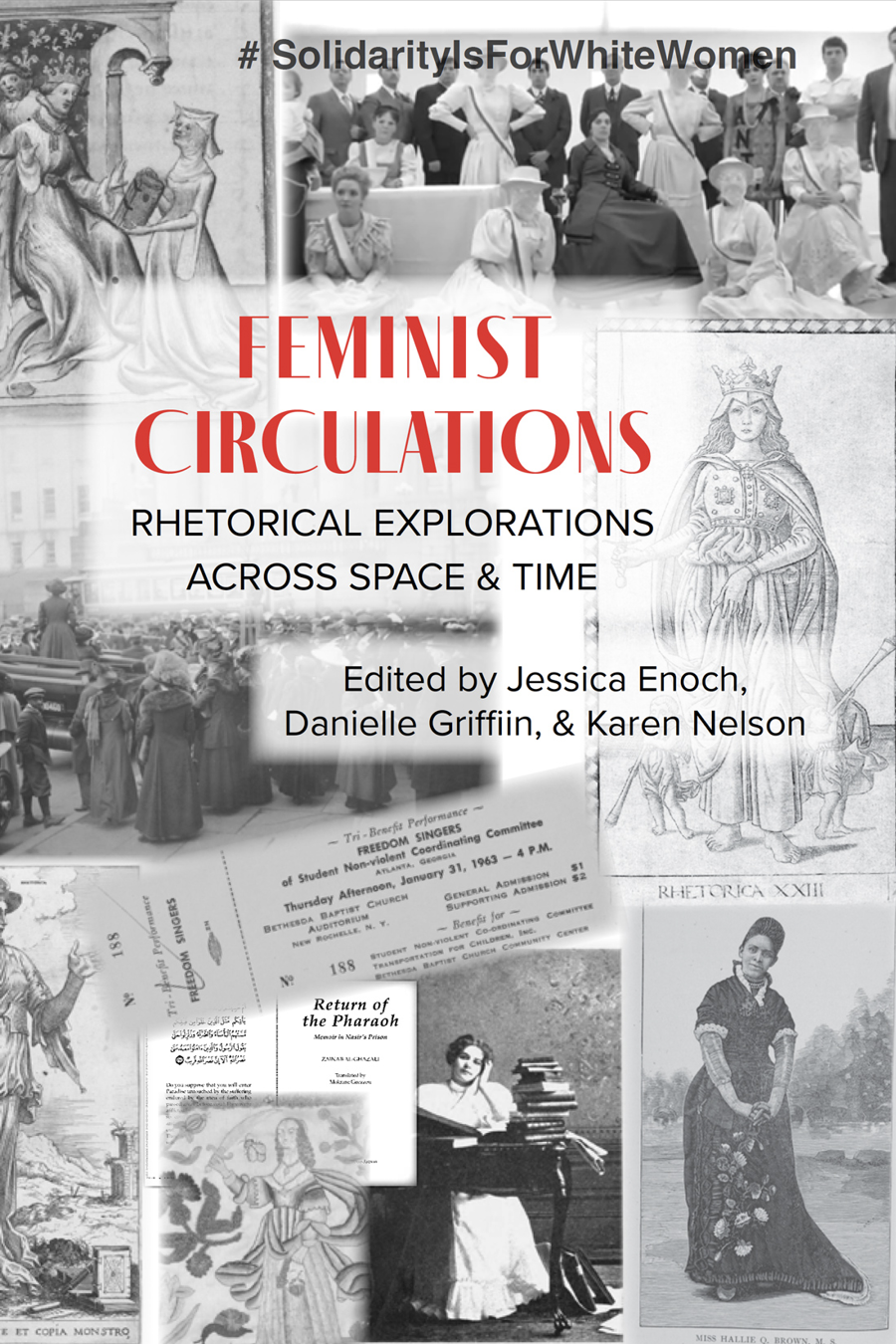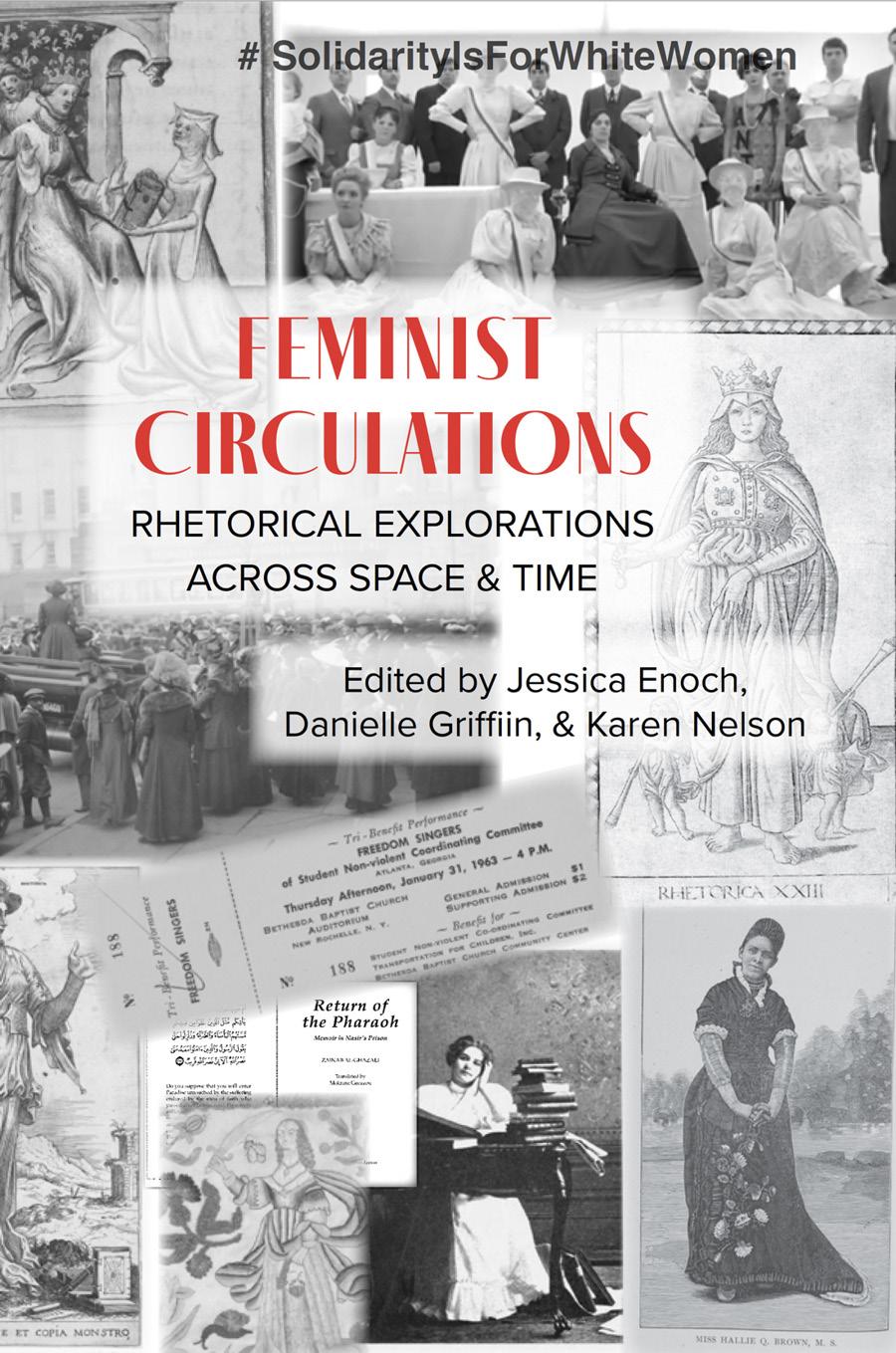Lauer Series in Rhetoric and Composition
Editors: Thomas Rickert and Jennifer Bay
The Lauer Series in Rhetoric and Composition honors the contributions Janice Lauer has made to the emergence of Rhetoric and Composition as a disciplinary study. It publishes scholarship that carries on Professor Lauers varied work in the history of written rhetoric, disciplinarity in composition studies, contemporary pedagogical theory, and written literacy theory and research.
Books in the Series
Feminist Circulations: Rhetorical Explorations across Space and Time
(Enoch, Griffin, & Nelson, 2021)
Creole Composition: Academic Writing and Rhetoric in the Anglophone Caribbean (Milson-Whyte, Oenbring, & Jaquette, 2019). MLA Mina P. Shaughnessy Prize 2019-2020, CCCC Best Book Award 2021.
Retellings: Opportunities for Feminist Research in Rhetoric and Composition Studies
(Enoch & Jack, 2019)
Facing the Sky: Composing through Trauma in Word and Image (Fox, 2016)
Expel the Pretender: Rhetoric Renounced and the Politics of Style (Wiederhold, 2015)
First-Year Composition: From Theory to Practice (Coxwell-Teague & Lunsford, 2014)
Contingency, Immanence, and the Subject of Rhetoric (Richardson, 2013)
Rewriting Success in Rhetoric & Composition Careers (Goodburn, LeCourt, & Leverenz, 2012)
Writing a Progressive Past: Women Teaching and Writing in the Progressive Era (Mastrangelo, 2012)
Greek Rhetoric Before Aristotle, 2e, Rev. and Exp. Ed. (Enos, 2012)
Rhetorics Earthly Realm: Heidegger, Sophistry, and the Gorgian Kairos (Miller) *Winner of the Olson Award for Best Book in Rhetorical Theory 2011
Techne , from Neoclassicism to Postmodernism: Understanding Writing as a Useful, Teachable Art (Pender, 2011)
Walking and Talking Feminist Rhetorics: Landmark Essays and Controversies
(Buchanan & Ryan, 2010)
Transforming English Studies: New Voices in an Emerging Genre
(Ostergaard, Ludwig, & Nugent, 2009)
Ancient Non-Greek Rhetorics (Lipson & Binkley, 2009)
Roman Rhetoric: Revolution and the Greek Influence , Rev. and Exp Ed. (Enos, 2008)
Stories of Mentoring: Theory and Praxis (Eble & Gaillet, 2008)
Writers Without Borders: Writing and Teaching in Troubled Times (Bloom, 2008)
1977: A Cultural Moment in Composition (Henze, Selzer, & Sharer, 2008)
The Promise and Perils of Writing Program Administration ( Enos & Borrowman, 2008)
Untenured Faculty as Writing Program Administrators: Institutional Practices and Politics , (Dew & Horning, 2007)
Networked Process: Dissolving Boundaries of Process and Post-Process (Foster, 2007)
Composing a Community: A History of Writing Across the Curriculum
(McLeod & Soven, 2006)
Historical Studies of Writing Program Administration: Individuals, Communities, and the Formation of a Discipline (LEplattenier & Mastrangelo, 2004). Winner of the WPA Best Book Award for 20042005
Rhetorics, Poetics, and Cultures: Refiguring College English Studies Exp. Ed. (Berlin, 2003)
Feminist Circulations
Rhetorical Explorations across
Space and Time
Edited by Jessica Enoch,
Danielle Griffin, and Karen Nelson
Parlor Press
Anderson, South Carolina
www.parlorpress.com
Parlor Press LLC, Anderson, South Carolina, USA
2021 by Parlor Press
All rights reserved.
Printed in the United States of America
S A N: 2 5 4 - 8 8 7 9
Library of Congress Cataloging-in-Publication Data on File
978-1-64317-242-2 (paperback)
978-1-64317-243-9 (hardcover)
978-1-64317-244-6 (pdf)
978-1-64317-245-3 (epub)
1 2 3 4 5
Lauer Series in Rhetoric and Composition
Editors: Thomas Rickert and Jennifer Bay
Cover design by Karen Nelson.
Printed on acid-free paper.
Parlor Press, LLC is an independent publisher of scholarly and trade titles in print and multimedia formats. This book is available in paper, cloth and eBook formats from Parlor Press on the World Wide Web at http://www.parlorpress.com or through online and brick-and-mortar bookstores. For submission information or to find out about Parlor Press publications, write to Parlor Press, 3015 Brackenberry Drive, Anderson, South Carolina, 29621, or email editor@parlorpress.com.
Contents
Circulating Feminist Rhetorics: An Introduction
Jessica Enoch, Danielle Griffin, and Karen Nelson
C irculation. This rhetorical concept animates and distinguishes the feminist scholarship within this collection. At base, one way to define circulation from a rhetorical perspective is to see it as the suasive consequentiality of movement. Or as Laurie Gries writes, and as we elaborate on below, circulation prompts scholars to attend to the rhetorical process that enables people, ideas, images, and discourse [to] become persuasive as they move through the world and enter various associations (12). Speaking in unison, the chapters herein demonstrate the potential for this concept to enhance understandings of what womens rhetorics can do and how feminist rhetorical studies can operate. To articulate the overarching project of Feminist Circulations in this introduction, we consider the intellectual history of circulation within feminist rhetorical studies, define the term and its attending methodology, and assert the importance of circulation as a guiding principle for our summative work. As we establish the theme for the volume, we also use this introduction to identify the related contributions the chapters make in terms of feminist recovery and rhetorical theory as well as research methods and methodologies.
Before delving deeply into the tenets of feminist circulation studies that drive this collection, we want to mark the specific rhetorical context that inspired this collection and enabled these ideas to circulate to our readers. The seeds of this collection were planted in spring 2017, when we gathered in College Park, Maryland, to celebrate the careers of Jane Donawerth and Shirley Wilson Logan at a conference titled Women, Rhetoric, Writing . The implicit exigence was for presenters to show how these two exemplary scholar-teacher-mentors had inspired the presenters research and writing. The conference itself brought to life the networks and connections Donawerth and Logan had made throughout their fantastic careers; conveners contributions served as evidence of the ways their ideas had inspired those across the academy. Indeed, the conference made clear how Donawerths and Logans ideas have circulated through fields from rhetoric and composition studies to womens studies and from early modern literary studies to African American literature and rhetoric. When we decided to collect work for this volume, then, the theme of circulation became a distinct connective tissue among the chapters, and with this theme, we once again recognize Donawerths and Logans abiding influence on a generation of scholarship.
In 1999, Shirley Wilson Logan anticipated this discussion regarding circulation of argument in her text We Are Coming: The Persuasive Discourse of Nineteenth-Century Black Women . Here, she turns readers attention to the ways arguments carry and echo across time and circumstance. In her study of rhetors such as Sojourner Truth and Fannie Barrier Williams, Logan uses the term recurrence to describe the argumentative repetitions she traced across African American womens rhetorical traditions. As Logan explains, Black womens arguments and strategies have at times repeated because they have arisen from similar but not identical rhetorical situations (xiv). Logan argues that they do so because they are common practices that were molded and constrained by prevailing conventions and traditions (xiv). Arguments recur because exigencies recur, and one way to understand and discern a tradition within African American womens rhetoric, as Logan models, is by tracking rhetorics that circulate and recirculate due to exigencies and situations.

